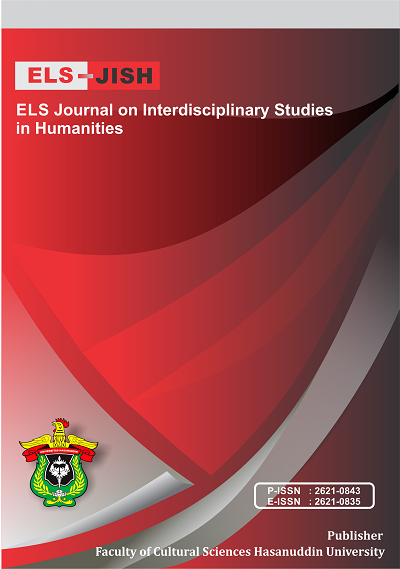The Influence of Cultural Acculturation on the Communication Behavior of the Bugis Community in Boroko Utara Village, Bolaang Mongondow Utara Regency
DOI:
https://doi.org/10.34050/elsjish.v7i1.34381Keywords:
Bugis society, Communication behavior, Cultural acculturationAbstract
This study aims to determine the influence of cultural acculturation on the communication behavior of the Bugis community in Boroko Utara Village. The research design employed in this study is quantitative, utilizing a survey method. There were 42 samples in this research. The data analysis method used simple regression analysis. The study's results indicate that cultural acculturation significantly influences the communication behavior of the Bugis community in Boroko Utara Village, with a coefficient of 0.626 or 62.6%. This is attributed to the Bugis community's long-term adaptation. For instance, the Bugis community has embraced the customs and traditions of the Boroko Utara Village community. Additionally, factors such as rapid speech delivery, adaptability, self-confidence, and historical relationships have contributed to the Bugis community's integration into the Boroko Utara Village community. The greater similarity between Bugis and Boroko Utara Village cultures, which constitute their new environment, facilitates and accelerates cultural acculturation, consequently affecting changes in their communication behavior.
References
Al-Obaydi, L. H., Jawad, Z. A., & Rahman, F. (2022). Class-home Connection Using Communication Technology and its Impact on Anxiety Reduction and Academic Performance. Al-Adab Journal, 1(141), 53-66.
Aririguzoh, S. (2022). Communication competencies, culture and SDGs: effective processes to cross-cultural communication. Humanities and Social Sciences Communications, 9(1), 1-11.
Astuti, T. (2017). Akulturasi budaya mahasiswa dalam pergaulan sosial di kampus (studi kasus pada mahasiswa PGSD UPP Tegal FIP Unnes). Refleksi Edukatika: Jurnal Ilmiah Kependidikan, 8(1).
Erniwati, E., & Suldani, M. R. Y. (2020). Perubahan Perilaku Komunikasi Kaum Perempuan Pengguna Instagram Stories di Kota Makassar. KAREBA: Jurnal Ilmu Komunikasi, 330-340.
Kistanto, N. H. (2017). Kesenian & Mata Pencaharian-Upaya Seniman Tradisional & Populer dalam Pemenuhan Nafkah. Sabda: Jurnal Kajian Kebudayaan, 7(1), 43-86.
Kusumawati, T. I. (2019). Komunikasi verbal dan nonverbal. Al-Irsyad: Jurnal Pendidikan dan Konseling, 6(2).
Liliweri, A. (2020). Dasar-Dasar Komunikasi Antarbudaya. Pustaka Pelajar. Yogyakarta
MacDonald, M. N. (2022). Issues, controversies and difficult questions: languages and intercultural communication, twenty years on. Language and Intercultural Communication, 22(3), 253-265.
Mulyana, D., & Rakhmat, J. (1990). Komunikasi Antarbudaya. PT. Remaja Rosdakarya. Bandung.
Nicoleta, P. R. (2023). The impact of intercultural communication on cultural intelligence. Management and Economics Review, 8(2), 220-236.
Rafajac, O., & Jakupović, A. (2023). Introduction to Integral Communication. In Integral Communication and Digital Identity (pp. 1-48). Cham: Springer Nature Switzerland.
Rahman, F., Akhmar, A. M., Hasyim, M., Dalyan, M., & Rahman, F. F. (2022). The Virtue In Core Values of Buginese Culture: A Worldview from Philosophical, Religious, and Moral Perspectives. Al-Qalam, 28(2), 197-207.
Ricca, M. (2022). The ‘Spaghettification’of performativity across cultural boundaries: The trans-culturality/trans-spatiality of digital communication as an event horizon for speech acts. International Journal for the Semiotics of Law-Revue internationale de Sémiotique juridique, 35(6), 2435-2479.
Ridwan, A. (2016). Komunikasi Antar Budaya : Mengubah Persepsi dan Sikap Dalam Meningkatkan Kreativiitas Manusia. Pustaka Setia. Bandung.
Shoelhi, M. (2015). Komunikasi Lintas Budaya Dalam Dinamika Komunikasi Internasional. Simbiosa Rekatama Media. Bandung.
Sugiyono. (2019) Metode Pendidikan Pendekatan Kuantitatif, Kualitatif, R & D. Alfabeta. Bandung.
Suma, M., Rahman, F., Dalyan, M., Rahman, F. F., & Andini, C. (2023). Literature And Family Development: A Character Building Education. Journal of Namibian Studies: History Politics Culture, 39, 220-232.
Sukmawaty, Rahman, F. F., & Andini, C. (2022). Covid-19 Pandemic and Axiology of Communication: A Study of Linguistic Phenomena. IJISRT, 7(4), 1079-1087.
Weda, S., Atmowardoyo, H., Rahman, F., & Sakti, A. E. F. (2021). Linguistic aspects in intercultural communication (IC) practices at a higher education institution in Indonesia. Eroupean Language Scientific Journal, 14(2), 76-91.
Downloads
Published
How to Cite
Issue
Section
License
Copyright (c) 2024 Minarni Tolapa

This work is licensed under a Creative Commons Attribution-ShareAlike 4.0 International License.






